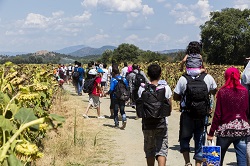EU researchers and policymakers debate European human rights challenges
The three roundtables, which included a number of high-profile speakers from academia, the European institutions and relevant trade bodies and NGOs, focused took place at the Royal Library of Belgium on 6 June 2016. The three topics covered were human rights with regards to economic and social rights, the ongoing migration crisis, and terrorism. Social and economic rights During the first roundtable, centred on the broader subject of how human rights impact on EU citizens’ overall economic and social rights, many of the speakers placed much emphasis on how the EU’s recent economic crises since the 2008 financial crisis have impacted negatively on human rights within the EU. Prof. Karin Lukas from the Ludwig Boltzmann Institute, argued that one of the key issues in this regard has been that fiscal decision-making and human rights considerations are not linked at the policy level. She argued that this has been the case in Greece, and that no recommendations on how to guarantee citizens’ economic and social rights were included in the formulation of the country’s various austerity programmes. She suggested that one solution could be for human rights-specific assessments carried out by governments in order to pinpoint specific problems and thus be able to receive the right expertise on how to address them. Mr Jeroen Jutte, representing the European Commission, responded to criticism regarding the European Semester, the EU’s annual cycle of economic policy guidance and surveillance, by arguing that the programme does place emphasis on social investment and that the key is to find the right balance between fiscal stability and addressing the needs of social hardship. Moreover, he painted a broader picture, arguing the importance of wider economic trends, such as the growing automation in industry, and whether manufacturing jobs could be maintained as a result of these trends. The overall key point taken from the debate was that human rights are fundamentally about individuals and that more concrete steps must be put into action to ensure access to justice with regards to citizens’ social and economic rights. The migration crisis In possibly the most heated of the three policy debates, Dr. Thomas Gammeltoft-Hansen, Research Director at the Raoul Wallenberg Institute of Human Rights and Humanitarian Law, stated that some EU Member States have been overwhelmed by the need to ensure the human rights of large refugee populations within their borders and others are ‘doing everything they can to avoid their responsibilities and make themselves less attractive to migrants.’ Prof. Wolfgang Benedek, a member of the FRAME consortium, outlined how active the project has been in exploring human rights in the context of migration to the EU. He expanded on the need to modify the Dublin Regulation for asylum claims and his concerns on how the Dublin system would work if some Member States refuse to take on their share of refugees. He stated that financial incentives may be a good start, but argued that there should also be a more comprehensive approach which gives due attention to the human rights aspect, which is not outspoken or evident enough in current EU proposals on how to reform the Dublin system. Another part of the discussion was concerning the difficulty in conducting empirical research with regards to human rights and migration, due to the fact that events on the ground can often move quickly. Miss Linda Ravo, representing the European Commission’s DG Justice, explained that with research on the ground, one of the most challenging aspects is gathering data on migrant children, particularly unaccompanied children. She stated that the Commission is now developing a comprehensive approach in order to protect migrant children. Human rights and the threat of terrorism In the third and final debate, Prof. Elina Pirjatanniemi from Abo Akedemi University in Finland, emphasised the need to maintain a discourse on security from terrorism threats within the democratic arena. She believed that one of the possible ways to do this is through what much of the discussion of the first panel on social and economic rights addressed – in essence, the ability to see human rights from a much broader perspective and to protect fundamental rights as a means to protect against the threat from terrorism. Finally, much of the discussion in this policy debate was on the importance of data collection as a means to combat terrorism, and whether such collection poses a threat to individual human rights. Joe McNamee, Director of EDRi, an NGO that protects digital rights argued that the long-term storage of data is not only pointless but also illegal, even though he has been very worried by EU-level legislative moves in this direction. Mrs Annemieke Dokter, representing the European External Action Service (EEAS), agreed and inputted that data collection only makes sense if it is possible to interpret what the data means. Overall, it was agreed that there was a fine line to walk between guaranteeing citizens’ human rights and providing security against terrorist threats. The FRAME project is an international research consortium that is focusing on the contribution of the EU’s internal and external policies to the promotion of human rights worldwide. The project is due to end in April 2017 and has received nearly EUR 6 500 000 in EU funding. For more information please see: project website(opens in new window)
Countries
Belgium



